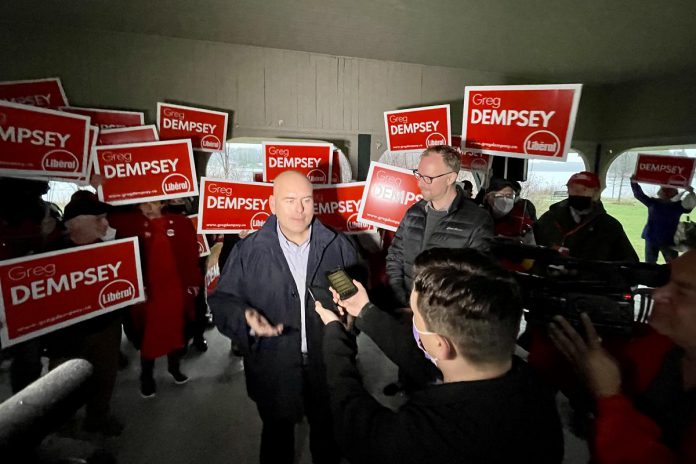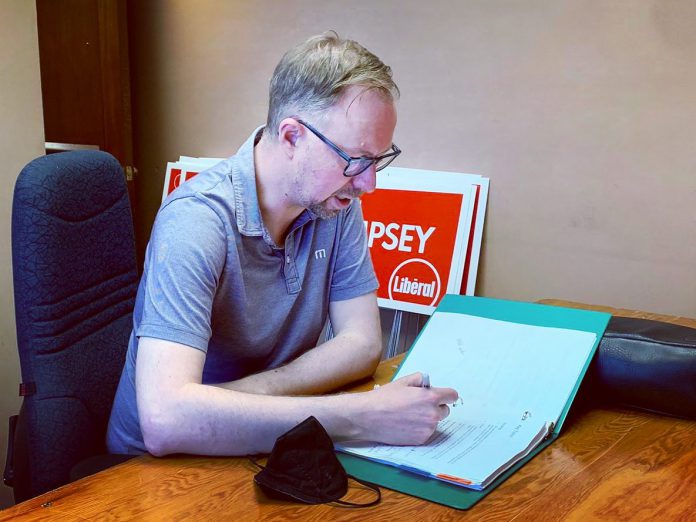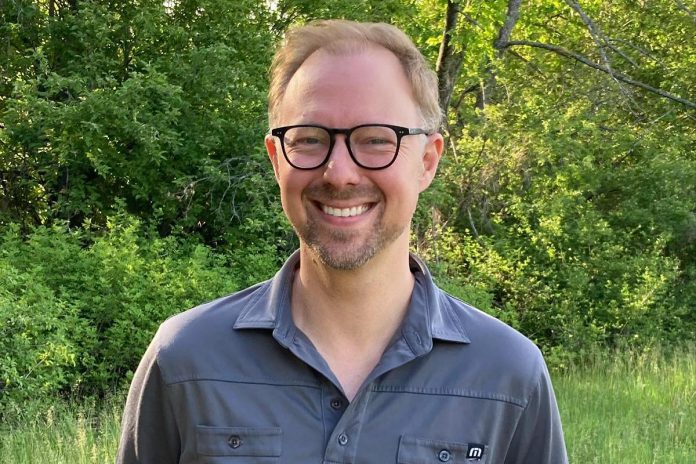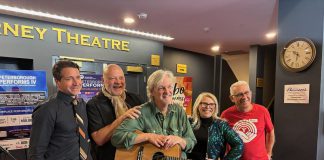Greg Dempsey has the air of a favourite teacher or coach. In conversation, he leans his head down or to the side as though trying to get closer to whomever he’s speaking with. He’s tall after all. He looks you in the eye, and listens, very carefully.
I’ve watched Greg interact with constituents at his rain-soaked campaign launch, I’ve listened to him debate, and I’ve paid attention to his Tweets.
When I spoke to him via Zoom recently, he was exactly what I’d come to expect — engaged, thoughtful, and bright.
Born and raised in Peterborough, Dempsey left town after graduating high school in 1999 and went on to earn four degrees from three universities. A trained lawyer, Dempsey decided to eschew the glamorous grind of corporate law and instead opted for a career of service with Global Affairs Canada, the arm of the federal government that manages diplomatic relations, promotes international trade, and provides consular support.
Over the course of the next 14 years, Dempsey was sent to work in Afghanistan, New York, and Ottawa. He tells me he came back to his hometown at the height of the COVID-19 pandemic because his life in Ottawa had come to a standstill.
On his own, and with out-of-country assignments on indefinite pause, Dempsey called his mother.
“Canada has seen fit to send me to a lot of really interesting places to do a lot of really important things, and then there I was in my empty apartment by myself,” he says. “So I called up my family and said okay, it’s time to be back in Peterborough. If I can do my job from Peterborough then let’s do that, so that’s why I decided to come back.”
I wanted to get a better understanding of who Greg Dempsey is, what he’s passionate about, who influenced him growing up, and why he decided to run for public office. It was also important for me to be sure to centre the concerns of kawarthaNOW readers in my questions about party policy.
In order to get a sense of what’s on your minds, we published a poll that asked you to rank 11 issues of concern, as well as to tell me what we may have missed. With that in mind, what follows is our lightly edited (for length and clarity) conversation.
Justin Sutton: We know you’re a human rights lawyer who has worked for Global Affairs Canada, serving in Kabul, Afghanistan, the United Nations, and the Privy Council Office. Aside from Human Rights Work, what else are you passionate about?
Greg Dempsey: There was a real turning point in my career when I was in Afghanistan I would say. I’ve always been interested in that country — I was interested in the sacrifice that Canadian forces troops had made there, and I really thought that Canada still needed to have a voice in Afghanistan.
One of the jobs that I got to do there was run the “Canada Fund for Local Initiatives” which is a small program we have in each of our embassies abroad in developing countries to help local organizations with different things.
My very favourite was working with an organization called “Free to Run”, which helped get girls involved with sports and especially in running because in Afghanistan the girls can’t openly participate in sports — it’s too looked down upon. So they would help find locations where they could just go out and play soccer, or just go on a run. It was a tiny little organization, and we got to help them directly.
I actually went up to Bamiyan Province to see one of their projects and that really made a huge impact on me because at the UN we worked on these huge issues that were very important but we were like beyond 10,000 feet on all of the issues, right? But here I was in Afghanistan with this tiny little organization that was really making an impact in girls’ lives and I got to meet some of the girls that were actually impacted by the work of that organization, and I think that was the moment where I recognized that this was some of the work that I wanted to do.
So, when the opportunity came up to run for provincial office, you know the province, I think, has the most direct impact on people’s lives. Municipal government has a similar impact but, if you’re choosing between federal and provincial, the provincial government really is in people’s lives more than the federal government.
JS: You’ve talked a lot about the influence your parents and grandmother have had on you. I’ve even heard you mention a well-known local science educator, Drew Monkman, as an important influence. Who else has had a profound impact on you and why?
GD: People ask me why I decided to run for the Liberal Party of Ontario and the very short answer to that question is Peter Adams. I went to high school during the Mike Harris years, and I remember I was in my grade nine social science class. It was the day after the 1995 provincial election, and we were talking about the election of Mike Harris as premier and whether or not that was going to matter. (It) turns out — spoiler alert — it did matter a lot.
Both of my parents were teachers and then we were out on the picket lines and I walked the picket line with my teachers and my mom, and Peter Adams came out to say hi and to chat with folks and express his support. Later, I got to canvass with Peter Adams, and he was just an incredibly lovely, caring politician. So from that point on, I kind of thought of myself as a Liberal.

JS: Is there an artist/musician/filmmaker/comedian whose work has informed your worldview?
GD: I do enjoy the odd Taylor Swift song. I’m little bit of a Swifty — she writes great songs! The band that I grew up listening to is called Travis and the lead singer of Travis [Fran Healy] is a great advocate for rights and social justice. I also love Metric; I’ve seen them five or six times. That was the last concert I went to in fall 2019. I miss going to concerts; I can’t wait to get to go do that again.
JS: In addition to wanting to know more about who you are, I wanted to centre this interview on the concerns of our readers. So we published a poll that put 11 issues to them and asked them to rank them. We also asked them to tell us if we missed anything. One observation I would make straight away is that our readers had trouble ranking what many said are co-equal, interconnected issues. So accepting upfront that our methodology is flawed, I’d like to take you through the results.
The number one issue of concern to 27 per cent of survey respondents is healthcare. Several respondents link their healthcare concerns to Bill 124, which limits wage increases for nurses, nurse practitioners, and other healthcare professionals. Others suggested mental healthcare should be much more of a priority for the next provincial government.
My observation is that the pandemic has revealed multiple intersecting cracks in the public healthcare system to Ontarians who may not have paid close attention before the pandemic. Do you think that’s a fair characterization of the concern and can you briefly outline the Liberal plan and connect it to your own point of view and skill set?
GD: I agree completely. There have been cracks showing in our healthcare system going back governments. We have the basis for an amazing system but, yes, a lot of cracks are showing. I will say that the very first thing that we will do will be to repeal the wage capping Bill 124. I think it’s a matter of fairness when we see inflation (rising) and we see the incredible work that healthcare workers have done — nurses and PSWs, and administration staff and everybody in our hospitals and our healthcare centres and our long-term care facilities. We need to pay them fairly.
When I talk to people in Peterborough (the issue) they’re most worried about is access to a family doctor. We need and deserve an MPP that is going to be willing and eager to make those tough phone calls and lobby on our behalf.
You’ll notice that when I asked our current MPP why it took so long to get a supervised consumption and treatment site in Peterborough, he blamed Dr. Piggott for that. I do not think that is fair — I mean, you’re the MPP (so) you should be accountable for how long things take. I want to make sure we get a community health centre in as quickly as possible.
JS: Climate change/environment was chosen by 21 per cent of respondents as their second ranked issue of concern. We covered the Liberal plan fairly extensively in our coverage of the environmental debate. Could you talk about this issue from a more personal perspective and outline the ways in which you think you can be helpful in pushing this issue forward.
GD: I’ve spoken to a lot of people between the ages of 16 and 25 and climate change is by far their top issue and they are feeling depressed about the progress that we are not making and what the world will become because of our overuse of fossil fuels and the massive amounts of carbon that we continue to pump into the air.
I was incredibly lucky that Drew Monkman was my grade four teacher, and almost every lesson in his class was infused with an environmental lesson and we created a community garden at the back of the school, and we would talk about Earth Day in a way that I did not get previously or subsequently and that just had a really big impact on the way that I looked at the world. It is the singular issue that the Doug Ford conservative government is handling so incredibly poorly.
They are doing a disservice to us, They are doing a disservice to future generations and Ontario can be a leader on these climate issues. I’ve studied international climate change law; I know people look to Ontario and they look to Canada for leadership.
The one thing about the previous Liberal government I’m most proud of is the cancellation of all of the coal-fired power plants. The removal of them from our electricity grid was the single best decision, I think, by a provincial government in the history of Canada to deal with climate and pollution. It was absolutely a game-changer. I do not think there is any way for us to take the emergency too seriously. We need to be leaders on this, and it’s quite frankly one of the reasons why I’m running in the election for the Ontario Liberal Party.

JS: Housing was chosen by 16 per cent of respondents as their third ranked issue of concern. House prices have skyrocketed, rents are tipping over into being flatly unaffordable. I’ve personally seen family’s take to Facebook Marketplace practically begging for someone to offer them an affordable place to live. How will a Liberal government respond to this crisis and effect meaningful change reasonably quickly?
GD: It’s a really, really big challenge. I think we need to be absolutely focusing on affordable places to live and that requires partnering with the municipalities, partnering with developers, but also partnering with housing advocates. There’s been a lot of incredible work in the community, like Peterborough Action for Tiny Homes, and the Mount Community Centre is an absolute beacon of incredible work to help people find rent geared to income housing, but it is an absolute crisis in our community.
I’m really proud of our plan that is going to get the province of Ontario back in the business of building housing. The Conservative plan basically gives all of the power over to developers; it punishes municipalities for actually taking the time to do an environmental review, or by-law review, or a review of the Indigenous rights implications of a development. It’s a plan to build million-dollar homes for people who don’t live in Peterborough and will do absolutely zero to fix the housing crisis for the people who need it.
We will create a new Ontario corporation to deal with housing. The houses it builds will only go to first-time home buyers, not foreign buyers, and not to people who are flipping houses. We also need help with by-law reviews to look at properties in the city and county of Peterborough that could be better used. Our plan looks at strip malls that are not being used, changing by-laws around allowing things like lane-way houses (and) turning a single-family home into a duplex or triplex.
This will be the choice for people in Peterborough-Kawartha. Do we want to build more million-dollar houses that will pave over our farmland or do we want to build denser homes that are small, affordable, safe, and convenient for people who need to get into the housing market who are under-housed or housing insecure who just want a place to live?
JS: Several people linked the housing crisis to the low rate of ODSP and the general rise in poverty in our community. How do you answer those who say the Liberal plan to raise the ODSP rate by 20 per cent doesn’t go far enough? One person told us they spend 89 per cent of their benefit on rent and can barely survive on the 11 per cent leftover. How do you answer their genuine concerns and feelings of hopelessness?
GD: It is just completely unacceptable what we’re giving people on ODSP. Our platform is fully costed. People know we will deliver these rate increases, but what I have been thinking about really is that the ODSP system as a whole is broken. It’s why I’m so excited that we’re going to bring back the basic income pilot because I think that bringing in basic income at a rate that is going to allow everyone to live in dignity, not just those who are on ODSP but indeed everyone. That’s going to be a complete game changer for this province.
It’s going to change how we do social assistance completely. I believe it’s going to save the province a whole bunch of money in emergency room visits, in shelter beds, in food back visits … just general health indicators. I think it has the opportunity to an amazing amount of good — much more good than raising the rates of ODSP by a certain amount would ever be able to do.
So in the short term, we will be raising the rate by 20 per cent over two years. I believe that government can do, when done well, such amazing good in people’s lives. We should be looking for big changing policies and that’s why I’ve run my entire campaign on restoring the basic income pilot.
JS: Finally, quite a number of community members told us they’re alarmed and fearful of the rise in political polarization, especially within the context of Jagmeet Singh’s visit to Peterborough on May 10. They want to know what you will do, if elected to represent Peterborough-Kawartha, to help ease seemingly intractable, and increasingly hate-fuelled, polarization.
GD: What happened in Peterborough on May 10 was wholly unacceptable. I believe that we have to confront hate and not let it grow deeper roots in our communities.
I am absolutely committed to working together, alongside all leaders in our community, to come together to speak with one voice and condemn the words, actions, and behaviours on display that day. This hate has no place in our community. That work requires building positive working relationships across the political divides with all elected officials. I reached out to every elected official in Peterborough-Kawartha following my nomination. We hosted dozens of great discussions and have already started the work of bringing people together.
My education and career demonstrate that I have the skills to build that collaboration, something that is currently lacking from our current MPP. I’m looking forward to taking up this important challenge once I’m elected on June 2.




























